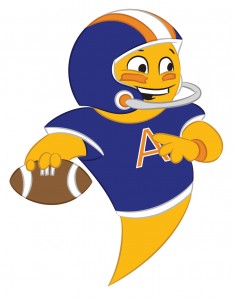You Want to Play Quarterback in College (part 1)

It’s no secret what a quarterback means to a college football team. It goes without saying that the quarterback is the most important person on the football field at any given time. If you are unsure of this, please look to the recent 2011 demise of the Peyton Manning–less Indianapolis Colts. Without a quarterback that understands how to poke holes in an opponent’s defense, push an offense up and down the field, or just make plays happen, a team is fighting an uphill battle. Although becoming the next Peyton may be a dream, we’ll start small. Let’s break down some key points that will help you work toward becoming a better quarterback and future college football recruit.
Exercise Your Brain with Football Knowledge
Quarterbacks are the most important athletes on the field, so it’s important that you’re also the smartest. Quarterbacks have to recognize instantly what defenses are attempting to do and adjust their offense to best expose that defense. Post-snap, the quarterback has very little time to read through each of his assigned progressions, choose the correct open target, and avoid pressure from his opponents; quick “rehearsed” decisions are vital to success.
While some football intelligence comes naturally to a player, most is instilled through the relationship the player has with his coach and his film room; both will come to be your greatest allies, allowing those quick “rehearsed” decisions to become fluid and natural. Coaches spend hours upon hours breaking down game film and expect that, as a quarterback, you’re putting in a similar effort.
Quarterbacks are responsible for knowing the assignment for every athlete in the offense for every play in their playbook. Many offensive schemes also require the quarterback to understand exactly what each individual athlete is going to do depending on a defensive lineup, shift, or reaction. Only constant scenario planning and studying will allow this to become second nature.
Get Coached by the Best
Scattered around our great country are professionals who’ve made careers developing raw, unpolished young talent at the quarterback position. Some coaches are private, while others work for the very colleges and universities you’re dreaming of attending. Serious college football recruiting hopefuls should be looking to these individuals for help and guidance.
Attending a camp(s) at a coach’s respective location is an easy way of accomplishing this goal. College football camps are held by specific schools as well as private companies and individuals; all will provide good information and great experiences. Attending a few each summer allows an opportunity to increase your knowledge and skills. Remember to not “just show up and play.” Make sure to do your homework before signing up; find out who will be in attendance, what their coaching experience is, what possible drills they might be teaching, etc. If it’s affordable, think about a private quarterback coach who can provide very important one-on-one instruction.
Win the Genetic Lottery
At the lower levels, quarterbacks come in all shapes and sizes. This range seems to shrink as you progress from high school to the college and professional levels. Gone are the days of a 5-feet-9-inch Doug Flutie seeing much success, and in are the days of success coming at a TALL price. Since wishing yourself to be 6 feet, 5 inches and 240 pounds is impossible, you’re banking on genetics. Quarterback size advantages are important in college football recruiting; coaches want an athlete who can see over the lineman in front of them. Check out our size chart to see if you measure up with today’s college quarterback.
You Want to Play Quarterback in College (Part 2)
Do you have questions about playing college football? Leave your questions in the comments section below or connect with us on Facebook , Twitter, or Google+!
Find opportunities for athletic scholarships and get connected to college coaches.
